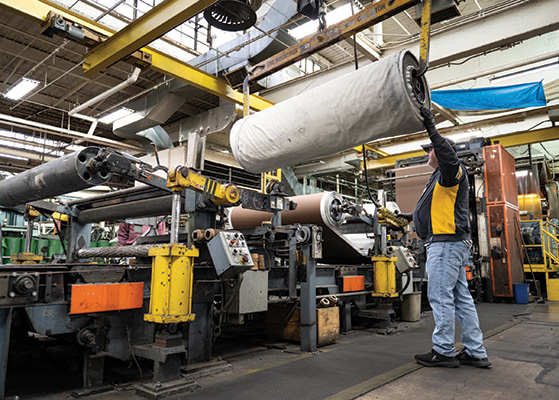Volume 28 | Issue 2
By Caden Pearson, Workforce Development Coordinator, Lincoln Partnership for Economic Development (LPED)
Click here to read the complete illustrated article or continue below to read the text article.
The National Association of Manufacturers reported 449K open manufacturing jobs in March 2025, with companies across the U.S. desperately trying to upskill and fill these roles as the nation presses forward on its reshoring mission.
It also projects that over the next decade, 3.8 million manufacturing jobs will be needed, and 1.9 million are likely to be unfilled if more people don’t pursue modern manufacturing careers. Of open jobs, 2.8 million will come from retirement and 760,000 from industry growth. An additional estimated 230,000 jobs will be created from recent legislative and regulatory actions. Meanwhile, attracting and retaining talent is the primary business challenge indicated by manufacturing companies.
The challenge doesn’t stop there. As manufacturing continues to advance, it requires skilled workers. According to occupation data from the US Bureau of Labor Statistics, projected growth of in-demand jobs is well-aligned with high demand skills in recent years. As manufacturing continues to modernize, the need for highly skilled workers will follow suit.
In Lincoln, Nebraska, manufacturing is the second-largest economic engine. The Lincoln Manufacturing Council (LMC)—an industry- led collaborative—creatively addresses the local employment gap, helping 20 companies secure talent. LMC was formed in 2019 as a result of three large manufacturers in Lincoln all acknowledging the gap in workforce development opportunities specific to the industry. Leaders from these companies, in collaboration with The Lincoln Partnership for Economic Development (LPED), built an entry-level curriculum designed for individuals with no prior experience in manufacturing to quickly gain the competency and confidence needed to succeed in a career in the industry. Today, LPED continues to operate LMC with industry input from an Advisory Board of manufacturing leaders.
The organization offers multiple certificate pathways, from introduction to manufacturing for entry-level positions to an advanced upskilling program for individuals with prior manufacturing experience.
The Manufacturing Basics Certificate (Level One) provides a unique learning opportunity for under- or unemployed individuals interested in the field. The 12-hour program includes training in crucial skills like blueprint reading, interpreting work orders, and workplace safety taught by a trained instructor with industry experience. The class also includes in-depth tours of manufacturing facilities outside of classroom time. It culminates with a job fair for participants to apply for jobs immediately after earning their certificate. Supportive services like transportation, childcare, and meals are also available, and upon meeting all program requirements, graduates are given a $250 supportive service payment.
The Manufacturing Skills Certificate (Level Two) is intended for individuals with prior experience looking to polish their skills to find career growth and stability. Upon completing this program’s three modules, participants will earn a certification that signals to employers their status as a skilled manufacturing professional, distinguishing them from entry-level candidates. The Manufacturing Skills Certificate is taught in partnership with Southeast Community College, our local community college, which is dedicated to investing in innovative workforce development programming, and because of this partnership, the curriculum is a blend of classroom and hands-on experience in a precision machine shop.
Other programs include the Manufacturing Upskilling Scholarship and partnering with our local American Job Center to offer a manufacturing track of their summer Youth Employment Program. The Upskilling Scholarship is a fund that supports past LMC participants in acquiring other industry-specific certifications, and the Youth Employment Program aims at connecting youth ages 16-24 to on-the-job training experiences at local companies supplemented by advanced manufacturing and automation training. LMC also partners with Lincoln Public Schools to connect K-12 students to STEM pathways, which include manufacturing.

LMC’s goal is to expand the talent pool available to employers by designing accessible programs for individuals who have traditionally faced barriers to opportunity, such as New Americans, those utilizing supportive housing, and people exiting incarceration. Since launching in 2019, LMC has graduated over 400 individuals across all programs. Of those, more than 120 were preparing to reenter society after incarceration, and 38 were New Americans enrolled in English classes through a partnership with local literacy education experts.
In 2021, LMC received support from the City of Lincoln’s Workforce Development Program, funded by the American Rescue Plan. This support allowed LMC to offer additional Level One classes and continue to provide free meals, transportation, childcare, and supportive service stipends. Additionally, this funding was integral to LMC’s growth, allowing us to build on the entry-level curriculum and create the Level Two class and the scholarship fund. These benefits bring LMC closer to making its programs fully accessible to the audience we’re trying to support.
To sustain and grow its impact, LMC maintains strong partnerships with human service and workforce development professionals, continuously expanding outreach efforts. This approach not only creates pathways to eco nomic mobility for underserved individuals, but also gives manufacturing partners access to a broader, more diverse talent pool they might not otherwise reach.
LMC is successful because of the continuous support from local manufacturers. What started as a group of three companies: Kawasaki Motors Manufacturing Corp. and TMCO, both established in Lincoln in 1974, and Bison Inc. has grown to a council of 20 members. Any manufacturer in the community can join LMC through a tiered sponsorship program, and higher-level supporters gain a seat on the LMC Advisory Board, which meets quarterly to discuss industry trends and revise curriculum as needed to ensure that the LMC program remains relevant. While LPED coordinates the logistics and administrative side of programming, it’s crucial to have consistent feedback from industry professionals to ensure that LMC continues to meet the ever-evolving workforce and talent needs that manufacturers face.
LMC has had a transformative impact on the lives of refugees and New Americans, providing a pathway to meaningful careers and economic stability in their new community. Alla Polishchuk, who arrived in Lincoln in 2022 from Ukraine, is one such individual. Determined to build a future for herself in the United States, she enrolled in a special session of LMC’s Manufacturing Basics Certificate taught entirely in Ukrainian, made possible through a partnership with Lincoln Literacy, a local nonprofit providing free English language classes. Soon after, she secured employment with Kawasaki, one of LMC’s founding companies, as a line worker—a pivotal first step in establishing her new life.
Alla’s journey was supported by Eugene Korol, the class instructor, who also shares a Ukrainian background. Having resettled in Nebraska over 25 years ago, Korol now serves as a general foreman in the production welding department at Kawasaki. Reflecting on his role in the program, he shared, “It’s been a rewarding experience to help both my company and fellow Ukrainians.”
LMC’s inclusive approach has also opened doors for individuals like Yusra Taha, a refugee from Iraq. While her initial aspiration was to work in the education sector, language barriers made it difficult to pursue that path. Through LMC’s programming delivered in her native Kurdish, Yusra gained valuable manufacturing skills and a new sense of purpose and direction in Lincoln’s workforce.
These stories exemplify the power of workforce development to foster opportunity, dignity, and community for New Americans to build their lives in Nebraska.
As the manufacturing sector continues to grapple with job and skills gaps, workforce development programs like the LMC are becoming critical to meeting employer needs. LMC’s holistic, people-centered approach not only connects employers with qualified talent but also actively reduces the barriers that often prevent individuals from entering and advancing in the workforce. By aligning industry demands with individual support, LMC is helping to strengthen Lincoln’s community—driving economic development while empowering residents to build stable, rewarding careers.

About the Author:
Caden Pearson is the Workforce Development Coordinator at the Lincoln Partnership for Economic Development (LPED), where he plays a pivotal role in building talent pipelines and connecting job seekers with career opportunities in Lincoln, Nebraska. Caden is a Certified Social Worker with years of experience in the nonprofit sector, building collaborative partnerships and managing programming to support individuals who were at risk of and/or experiencing homelessness.
Scott Ellyson, CEO of East West Manufacturing, brings decades of global manufacturing and supply chain leadership to the conversation. In this episode, he shares practical insights on scaling operations, navigating complexity, and building resilient manufacturing networks in an increasingly connected world.